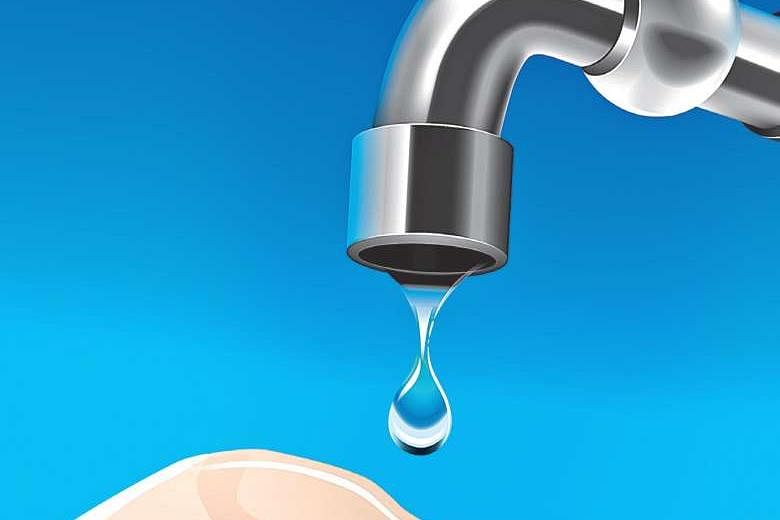I thought it was a joke when I heard it on the radio.
All the residents of Chapel Hill were being asked to stop using water from their taps until further notice.
According to the news broadcast on the morning of Friday, Feb 3, a water main supplying the town had burst and the spillage had caused water levels to drop so low that it was in danger of contamination.
To allow levels to come back up, everyone receiving piped water had to stop using it.
I turned off the washing machine and said to my husband: "If this is true, there will be a run on bottled water at the grocery store."
My husband seemed remarkably unconcerned. "I wouldn't worry about it," he said.

Nevertheless, I thought I should stop in at the Harris Teeter near the gym after my lunchtime workout.
As I parked the car, people were streaming out of the supermarket with carts piled with water.
Sure enough, the shelves were almost bare.
I stood there and stared at them with the other latecomers.
Finally, I left with one 24-pack of bottled still water and a case of sparkling water. As I passed a man loading up at the wine section, he joked: "At least we won't run out of beer."
I rang my mother-in-law, who was running errands in another town and advised her to buy water before coming home. She told me later the Walmart in Morrisville was low on water as well by the time she got there.
On social media, friends who had bottled water offered it to those who did not have.
There are 60,000 residents in Chapel Hill, North Carolina, and most are on piped water, though a small number have private wells.
Besides those who live or study here, however, thousands more commute to this college town to work.
The unexpected moratorium on water use upset just about every business in Chapel Hill and the adjoining town of Carrboro that day since no one could drink it, cook with it, wash with it or even flush the toilets.
Every restaurant was ordered closed. Hotels desperately rang those in Durham and farther afield to relocate guests. Weddings were moved, clinic appointments postponed. I wondered how the hospitals and the university, the town's main employers, coped.
Even the kids were sent home early from school, in the interest, I think, of personal hygiene.
This mishap had its beginning the day before, when an employee at the water treatment plant inadvertently added too much fluoride to the water supply.
The plant had to divert this entire supply of water to the sewage treatment system. Chapel Hill then asked its neighbour city of Durham for water, but there was already a critical shortage when the main line burst on Friday morning.
This unexpected mandatory rationing was a new experience for me.
Certainly, we have power outages every now and then, especially during storms. People still talk about Hurricane Fran, which in 1996 caused widespread destruction and shut down power in parts of the town for days.
But it was strangely unsettling to know every part of the town was impacted. Even my own house wasn't a place I wanted to be.
My husband said not to worry when I came home with my small supply of drinking water.
We have a swimming pool with 20,000 gallons (76,000 litres) in it, he reminded me. Pretty cold winter-time water, but he said he would do all the fetching and carrying.
I didn't relish the thought of drinking swimming pool water sterilised with a little bleach, but we could certainly use it to wash plates and fill the toilet cisterns.
You quickly learn that when having water means hauling buckets, you whittle down all its uses to only what you need. You also reorganise your life around its availability. We are eating dinner out, I declared. And all meals till it comes back.
We devoted one bucket to the toilet, aghast to find that half a 5-gallon pail was needed for a single flush.
I began warming pans of water for washing. Doing the dishes took far longer than usual and I had time to think about how to re-use the water: one basin to soap, one basin to rinse. Any leftover went to the toilet.
I sent a text to out-of-town friends who had invited us to a Chinese New Year potluck the next day that it didn't look like I could bring a dish after all. They offered commiserations and their shower.
Finally, a little frayed at the nerves and starting to consider a toilet schedule for everyone, I suggested we skip town and go to the beach for a few days, but that only got me a lecture for being a baby.
Once I stopped sulking, however, I had to concede the point. My husband had been to rural communities near the coast last October as a news photographer after the very destructive Hurricane Matthew had dumped millions of gallons of water into local rivers.
In towns such as Lumberton and Princeville, he saw homes that were submerged and people without power or clean water.
Seen from that perspective, I shut up and stopped whining.
I also thought a lot about Flint, that town in Michigan which had been supplied with toxic lead- contaminated water from a polluted river for two years because the state wanted to save money.
I gained a new appreciation for the people who work to supply our precious utilities.
Without those, we'd be spending most of our time looking for water or making fire, like many still do in less developed parts of the world.
In response to the break, the water authority asked other counties for help, while local businesses set up distribution points to give out bottled water to those who needed it.
The water in our taps was deemed safe to use at around 2pm on Saturday. In the end, I did bring a dish to my friends' party and we had showers beforehand.
When the dust had settled, businesses had lost several million dollars from the 24-hour shutdown and some home owners had damage to their properties due to flooding from the broken main.
Everything in our household went back to normal - a pity, in a way.
Though we had been given a glimpse of how quickly deprivation can turn to hardship and then crisis, habits die hard, even if one's intentions are good and the conscience is pricked.
It's not even because water is that cheap.
A household in Chapel Hill using 4,000 gallons (about 15 cubic metres) of water each month pays US$70 (S$99), including fees. The average Singapore household uses 17.6 cubic metres and pays much less, even at the new higher price.
Right now, Singaporeans are engaged in a conversation about the future of water security for the country.
Tariffs must rise in order to pay for infrastructural investments as well as - interestingly - to send a signal about the preciousness of this scarce resource.
The fifth National Tap, said one expert, should be to reduce demand.
In its long-range water supply plan, the water authority for my town also points to careful water use by its customers as key to future generations having high quality water to use.
For those of us fortunate to live in functional societies, we take for granted that clean water flows out of a tap when we turn it on.
I wouldn't have it any other way, but the realisation of what a luxury that actually is, gave me pause for thought and should still.


